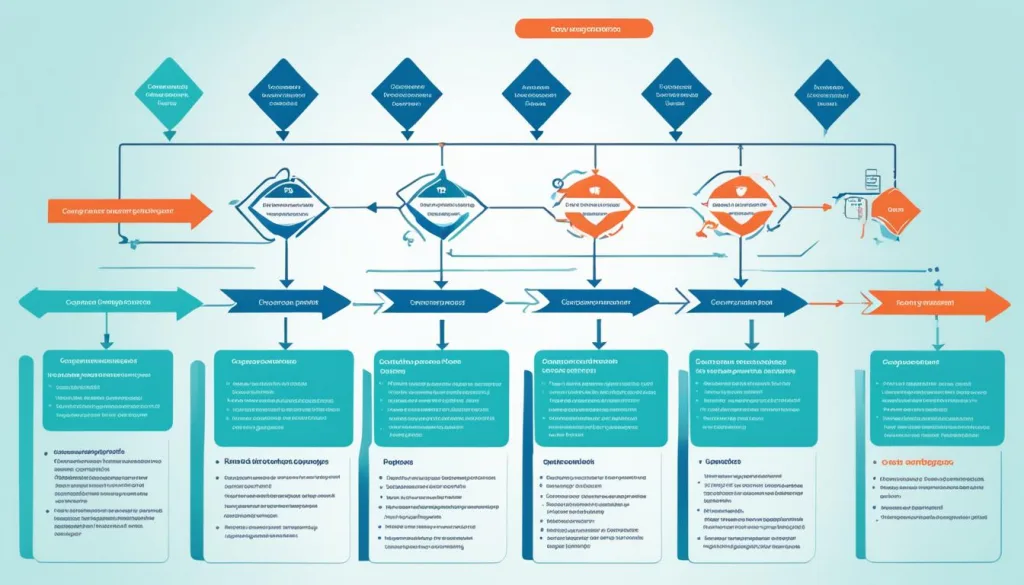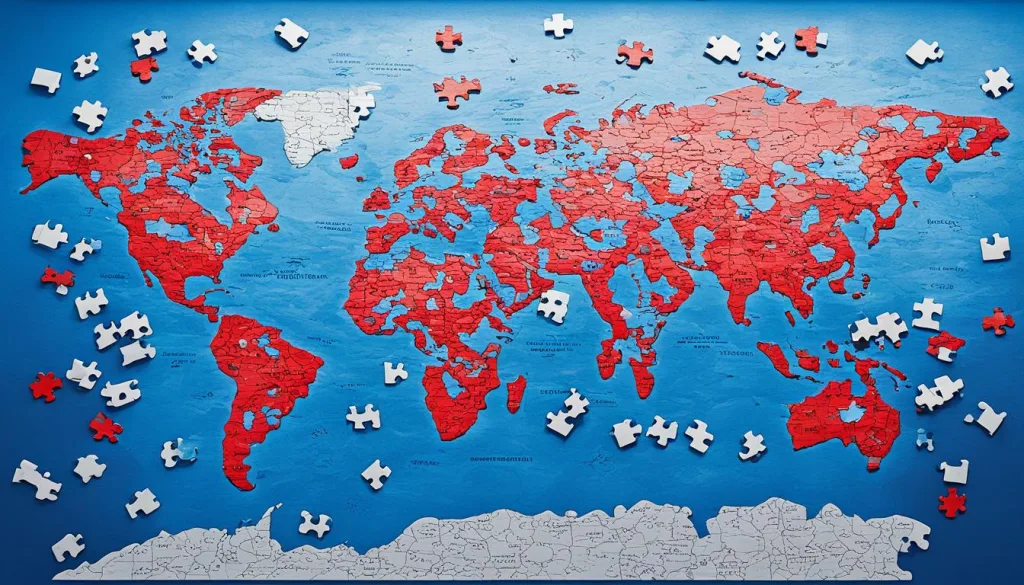Adapting to Changes in Global Import and Export Regulations
Connect With Us Today
Consider us for your next production run. Why wait? Send us your questions here.
As global trade grows, businesses face new compliance challenges. Keeping up with import-export regulations update is crucial for success in international markets. Understanding international trade policy adjustments and supply chain regulatory changes is a must. This helps companies stay competitive and access global markets.
Adapting to cross-border trade rules is more than a legal task. It’s a chance to improve operations and manage risks. Companies need to quickly adjust to these changes. This ensures they meet global market access requirements and enjoy the benefits of trading internationally.
Key Takeaways
- Importance of keeping up-to-date with global import-export regulations.
- The role of a strategic compliance program in operating successfully.
- Impact of regulatory changes on supply chain management.
- Consequences of noncompliance and benefits of regulatory adherence.
- Adapting to policy adjustments to ensure business continuity and growth.
The Critical Nature of Import/Export Compliance in Global Trade
The complexities of following global trade rules are huge. In our world, goods and services cross borders quickly, making it important to know the rules of import/export well. The fourth Ministerial meeting of the Trade and Technology Council (TTC) in Luleå, Sweden, talked a lot about working together across the ocean. This teamwork is about making technology better together and working for a world without carbon emissions. These goals show what’s important in today’s trade world1.
Navigating International Traffic in Arms Regulations (ITAR)
Dealing with ITAR needs you to pay close attention and have a strong plan. It’s crucial to understand the rules about military technology and services. The USA and the European Union are working together on new tech like AI and quantum tech. For these fields, following strict trade rules is a must1.
Complying with the Office of Foreign Assets Control (OFAC)
Following OFAC rules is also very important because of sanctions and export restrictions. OFAC’s tough rules help control international trade during political tensions. This was a big topic at the recent TTC meeting. Understanding and following these rules is key for businesses in the international market1.
| Compliance Focus | Strategic Importance | Collaborative Initiatives |
|---|---|---|
| ITAR Compliance | Secures sensitive technology trade | Joint US-EU technological advancements |
| OFAC Compliance | Manages sanctions and export controls | Support for Ukraine amidst conflict |
| WTO Reforms | Modernizes global trade rules | Transatlantic Initiative for Sustainable Trade |
In conclusion, following import/export rules is key in global trade. Agreements on critical minerals or efforts to lower emissions in energy are part of this. Businesses worldwide must understand that their success depends on a good plan for global trade rules. This shows how crucial it is to follow these international rules1.
Key Regulations Governing Global Trade Compliance
Navigating through global trade rules is essential for businesses involved in exporting goods. It’s vital to understand and follow the Export Administration Regulations (EAR). This ensures trades are legal and avoids penalties. Most U.S. exports, about 95%, don’t need a license to be shipped abroad2.

Understanding Export Administration Regulations (EAR)
Even though many exports are not strictly regulated, some still require careful review. Less than 5% need a government license2. EAR99 classification covers most goods not on the Commerce Control List (CCL), allowing them to be exported without a license2. Yet, certain exports demand electronic filing in the Automated Export System (AES)2.
| Regulation | Requirement | Agency |
|---|---|---|
| EAR99 Classification | Mostly no license required for export | BIS |
| Section 758.1 of EAR | AES filing required for specific exports | BIS |
| ITAR Defence Items/Services | Potential registration required with U.S. Dept. of State | Direc. of Defense Trade Controls |
| OFAC Sanctions Compliance | Adherence to financial sanctions and restricted lists | U.S. Dept. of Treasury |
Companies must also consider registering with the necessary agencies. Trading in defense-related goods? You’ll need to know about ITAR. This means registering with the U.S. Department of State2. Following OFAC’s financial sanctions and checking restricted lists is crucial too2.
The scope of global trade compliance is wide, involving other agencies like the U.S. Customs and Border Protection (CBP). The Customs Modernization Act shapes how CBP works, focusing on security3. They handle duties, control the flow of goods, people, and ensure consumer and environmental protection3. Moreover, they play a key role in preventing smuggling and fraud3. CBP offices help ports understand these rules, and their global presence underlines U.S. trade regulation efforts3.
To wrap up, understanding EAR is crucial for global trading. It demands careful attention to item classifications and agency guidelines. Staying informed and compliant helps businesses avoid legal issues and risks in international exports.
Consequences of Noncompliance in International Trade
Ignoring import-export rules can have serious consequences for businesses and their stakeholders. In international trade, following rules and laws is a must. Not following them can lead to legal penalties, major financial losses, and harm to the company’s public image. This damage can last a long time. It’s vital to understand and follow all import-export regulations. The U.S. Trade Representative (USTR), started in 1962, shows the government’s commitment to maintaining trade integrity4.
| Aspect of Noncompliance | Implications | Agency’s Role |
|---|---|---|
| Trade Agreement Breaches | Legal action; withdrawal of trade privileges | USTR defends U.S. interests in WTO disputes4 |
| Regulatory Amendments | Need for ongoing compliance updates | Commerce Dept. revises regulations for efficacy5 |
| Trade Remedy Enforcement | Stringent scrutiny of goods; financial penalties | Effective enforcement of trade remedy laws5 |
| Reporting Violations | Fines; loss of export privileges | Monitoring compliance through alerts6 |
| Criminal Activities | Imprisonment; forfeiture of goods | Legal consequences for FTR violations6 |
The USTR takes the lead in U.S. trade policy and defends America’s trade rights4. The Department of Commerce is also stepping up. They update regulations to prevent rule circumvention. This strengthens our trade laws5. Moreover, the FTR calls for harsh civil and criminal penalties for fraud. It warns against false reporting through the AES6.
Being part of international trade requires constant awareness. The Commerce Department makes changes to keep up with the global market5. They also make new rules clearer and ask for feedback. This helps improve trade rules5.
“Understanding trade policies and committing to compliance helps avoid penalties, financial loss, and damage to reputation.”
Trade compliance covers everything from duty calculation to shipping costs. Every detail, including accuracy in reporting to how duties are charged, is important6. Any mistake can affect many areas of business. Staying informed and careful is key for success in global trade. It helps maintain honesty and respect for rules.
Adapting to Changes in Global Import and Export Regulations
In a business world where change is inevitable, adapting to changes in global import-export regulations is crucial. Quick adjustments are needed when laws shift. To stay ahead, it’s vital to update your business methods regularly.

Making smart updates to your supply chain can set you apart. Adjustments might involve new sources, renegotiated contracts, or new tech for compliance. These steps keep your business running smoothly, without losing money.
- Keep an eye on trade updates to see how they might affect you.
- Connect with trade groups and regulation experts for the latest news.
- Train your team on new rules to keep everyone on track.
Staying agile with international commerce lets you grow through challenges. Being quick to adapt protects you from legal trouble and boosts your reputation.
The
Becoming flexible with changing regulations is the way to not just survive, but to excel.
Establishing a Robust Trade Compliance Strategy
In today’s complex rules, a solid trade compliance strategy is key for international success. It’s crucial to have management commitment as the foundation. Senior officials must lead by example and spread export compliance standards throughout the company7.
Developing a Comprehensive Compliance Program
A comprehensive compliance program should be detailed, easy to access, and fit the company’s unique needs7. Developing such a program involves employee training, monitoring and auditing, and keeping records carefully7.
Effective and ongoing employee training is crucial. It helps team members know their duties in export compliance7. Monitoring and auditing check if the program works well. They help find areas to better and prevent rule violations7.
| Key Element | Component | Action Steps |
|---|---|---|
| Management Commitment | Export Compliance Standards | Establish and enforce organizational policies. |
| Risk Assessment | Export Operations | Conduct thorough analysis of operations to identify risks. |
| Compliance Training | Employee Responsibilities | Develop ongoing education programs for staff. |
| Monitoring and Auditing | Compliance Practices | Implement regular reviews and updates to compliance measures. |
| Recordkeeping | Export Compliance Records | Maintain detailed and organized documentation. |
To wrap up, making and following export compliance and security measures is crucial7. By actively managing export compliance – from assessing risks to keeping good records – businesses can avoid noncompliance and succeed worldwide7.
Conclusion
Following import-export rules is crucial in today’s global market. It’s not just about following laws. It’s about staying competitive in international trade. The Customs Modernization Act made importers more responsible. They must declare the value, classification, and duty rate of goods accurately3. This change highlights the importance of working closely with the CBP. Together, they ensure all data exchanged is clear and precise3.
Businesses must stay on top of changing import laws and limits on goods3. The CBP supports this with its wide network, including 20 Field Operations offices and 14 preclearance locations. They play a key role in applying guidelines and procedures at 324 entry points in the U.S. and beyond3. These ports are crucial for checking cargo, collecting duties, and carrying out safety inspections. They help protect our national security and economic interests3.
In short, keeping up with trade rules is vital for business supply chain management. It’s a big challenge that needs a solid plan of action. Companies must work closely with the CBP and always be ready for new legal duties. This careful approach is essential for businesses that want to succeed globally. Thus, making compliance a core part of business operations is key for gaining access to international markets3.
FAQ
What is the importance of adapting to changes in global import and export regulations?
What are the specific regulations that companies must navigate in international trade?
What are the key regulations governing global trade compliance?
What are the consequences of noncompliance with international trade regulations?
How should businesses adapt to changes in global import and export regulations?
What is the importance of establishing a robust trade compliance strategy?
What are the key takeaways from this article?
Source Links
- https://www.whitehouse.gov/briefing-room/statements-releases/2023/05/31/u-s-eu-joint-statement-of-the-trade-and-technology-council-2/
- https://www.trade.gov/us-export-licenses-navigating-issues-and-resources
- https://www.cbp.gov/sites/default/files/documents/Importing into the U.S.pdf
- https://www.ustr.gov/sites/default/files/Trade-Enforcement_Issues-Remedies-and-Roles.pdf
- https://www.federalregister.gov/documents/2023/05/09/2023-09052/regulations-improving-and-strengthening-the-enforcement-of-trade-remedies-through-the-administration
- https://www.ecfr.gov/current/title-15/subtitle-B/chapter-I/part-30
- https://www.bis.doc.gov/index.php/documents/compliance-training/export-management-compliance/1256-emcp-guidelines-november-2013/file
Latest News
How Collaboration Shapes Consumer Preferences in Sportswear
Navigating Consumer Rights and Warranties in Sportswear Sales
Artificial Intelligence in Fashion Forecasting and Trend Analysis
The Shift Towards Inclusive Sizing in Sportswear: Consumer Reactions
The Global Expansion of Luxury Sportswear Brands
From Sketch to Gym: The Design Process of Fashionable Sportswear
Understanding the Role of Trade Associations in Sportswear Compliance
How Economic Trends Influence Consumer Spending on Sportswear
Learning from Successful Global Market Entries
Best Practices for Managing Cross-Cultural Teams
Using Technology to Fight Counterfeit Fashion Products
Carbon Nanotube Fabrics for Superior Strength and Flexibility
The Growth of Fitness Tracking Apparel in Health and Wellness
Exploring the Influence of Social Proof in Sportswear Purchasing
Strategies for Managing Compliance in a Multinational Operation
Trends in Global Footwear: Performance Meets Lifestyle
The Role of Artificial Intelligence in Tracking Supply Chain Operations
Evaluating the Success of Sportswear Collaborative Projects
Evaluating the Potential of Emerging Markets
Global Shifts Towards Gender-Neutral Sportswear
Share This Article
Latest Articles



















